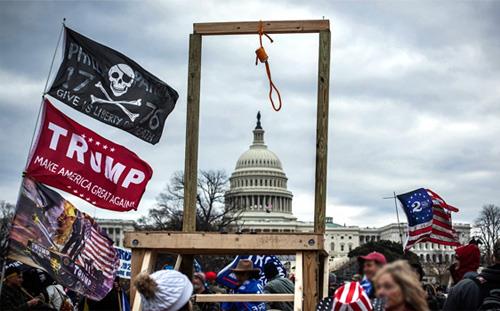
If you want to forget the last four years, then Trump's American Carnage is not the show for you to watch.
Trump's American Carnage, which airs Tuesday at 10 p.m. ET as part of PBS's Frontline series (check local listings), argues that the Capitol invasion of Jan. 6 represented the flowering of a plant that President Donald Trump had spent his whole term nurturing and watering.
At the same time, if you feel that the media have been collaborating with Democrats and liberals over the last four years to put the most ominous spin on the words and actions of Donald Trump, then you too will probably want to skip this one.
That said, the images here will feel disheartening even to those who disagree with the Frontline commentator who says the Charlottesville, Va., rally of 2017 set a defining tone for the Trump presidency.
Trump's American Carnage takes its title from another Trump moment in 2017, his Inaugural address. As part of his call to put America first, he vowed an immediate end to "American carnage."
He didn't define it further, and Frontline suggests he didn't have to, that it was a dog whistle to people who felt they had been ignored and figuratively beaten up for so long that it was time to fight back.
The Charlottesville rally, organized by white nationalist groups to oppose removing a statue of Confederate Civil War General Robert E. Lee, led to violent clashes between demonstrators and counter-demonstrators.
Trump denounced the violence but suggested responsibility lay with both white nationalist and anti-racist groups.
There were, Trump said, "good people on both sides."
Frontline endorses the long-voiced concern that this remark gave a subtle blessing to white supremacists and other fringe groups, telling them their public presence per se did not offend the president.
Trump subsequently made other remarks that Frontline argues had a similar effect, such as telling the militant far-right group the Proud Boys to "stand down and stand by."
Frontline includes several sound bites in which Trump similarly condemns violence but does not seem to condemn the group apparently implicated in it.
The reason, the documentary suggests, was purely transactional: They supported Trump in a loud and vocal manner, and he did not want to lose their support.
Frontline's narrative weaves these moments in with Trump's successful campaign to take full command of the Republican party, in large measure by making it clear those who opposed him would face retaliation.
This further empowered those who felt he was on their side, giving them a sense they were finally taking back "their country" from all those they felt had ignored and oppressed them: Democrats, minorities, radicals, immigrants, liberals, the media.
Therefore, it was almost inevitable that when Trump lost the 2020 election and began a fiery campaign to overturn the results, the radical fringe of his supporters saw it as a call to "finish the job" and reclaim America by force.
Frontline frames this with some irony – that Trump's vow to end "American carnage" would, four years later, lead to exactly that.
Not every viewer will agree that Trump is as culpable as Frontline suggests. But it's hard to disagree on at least one point: Trump's American Carnage is not a dog whistle. It does not take a "he said/she said" approach to its subject. It lays out its case with the certainty this is what happened, and this is why it happened.
It's not a flattering portrait of Donald Trump's presidency or words, and it suggests their troubling impact will not end with his departure from Washington.